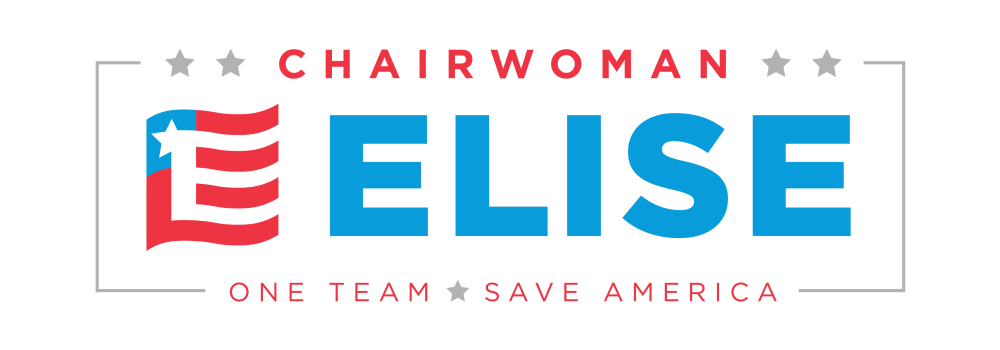Written by Cara Chapman in the Press-Republican on May 1, 2020
PLATTSBURGH — Next week, Rep. Elise Stefanik (R-Schuylerville) will start virtually meeting with working groups who represent various sectors of the North Country for their input on gradually reopening the region’s economy.
Stefanik has been appointed to both President Donald Trump’s Task Force to Re-open America and the Northeast Congressional COVID-19 Regional Recovery Task Force.
A positive consequence of that has been that her office has received “amazing ideas,” she said during a conference call with media Thursday.
“These are businesses, manufacturers, farms that have very proactive proposals about how we can make sure that we’re protecting public health but also be able to gradually reopen the economy.
We’re also hearing about needs for resources or policy solutions from the federal government.”
VIRTUAL ROUNDTABLES
The different working groups include community leaders that represent county public health, hospitals and community health centers, local and county government, small businesses and manufacturers (both with chambers of commerce), dairy issues, non-dairy agriculture issues, higher education, school superintendents, the northern border, tourism and hospitality, non-profits and special events, according to a press release from Stefanik’s office.
“The idea behind these working groups is they will function almost like virtual roundtables,” Stefanik said.
And they will work in tandem with other groups, such as the Clinton County working group that County Legislature Chair Mark Henry (R-Area 3) has assembled, she said.
The congresswoman said people are welcome to continue sending their ideas and feedback to her office.
These tasks forces aim to bring together community leaders in the same industries with whom she has had one-on-one conversations, such as college presidents.
“Many of them are grappling with the same issues about what their fiscal challenges are going to be, how they are dealing with their payroll, how are they transitioning to technology, what does their fall semester look like, what are the financial challenges,” she said.
“These are supposed to be moderated discussions so I can get a good feel for what proposals are out there and what support the federal government needs to provide.”
DIRECT AID
Stefanik said she was optimistic about a bipartisan compromise that includes funding for states and counties.
In briefings from town and county elected officials, she has heard about how much their budgets and operations have born the brunt of the COVID-19 impact.
The congresswoman said she has had conversations with President Trump directly and raised the issue of county and state aid, which she also included in the top priorities she sent in as a member of his task force.
Stefanik added that, in one-on-one conversations with U.S. Department of Health and Human Services Deputy Secretary Eric Hargan, she has gone over the financial challenges each of the district’s hospitals face and raised the issues specific to rural health care facilities.
“Rural hospitals, while they may not have had the same number of positive COVID cases the way downstate hospitals have, they are in such dire financial circumstances as it is in a regular year, let alone with a year with a pause on elective surgery.”
The exact formula for how HHS will distribute remaining relief funding to hospitals has not been shared, Stefanik said, adding that it was clear that rural hospitals’ situations need to be considered.
TESTING
Stefanik felt confident that the North Country would be able to ramp up COVID-19 testing.
Asked if Trump should use the Defense Production Act for more testing-related materials like swabs and reagents, Stefanik said he has implemented it numerous times during the crisis.
“I’ve been consistent in saying we should use that tool, that the president is uniquely positioned to use that tool.
My assumption is that the DPA will be utilized if necessary, but it has been already utilized numerous times.”
Antibody testing will be very important for discussions about re-opening the economy said, Stefanik said.
But while the state’s antibody survey showed low rates in the North Country — 1.2 percent of those tested were positive — a better understanding of the sample is needed, she added.
ELECTIONS, VOTING
Given public health data and decisions that have already been made, this year will make for a very complex election cycle, Stefanik said.
“We need to ensure we have a secure and safe election this November.”
She added that Congress has provided of hundreds of millions in funding for election support to ensure the necessary tools are available.
“We need to learn from 2016 where Russia was able to spread disinformation, sow discord, and make sure that never happens again.”
Stefanik said it was important to make sure the U.S. Cyber Command — part of the U.S. Department of Defense — has resources and Congressional oversight to ensure they are ramping up for November.
She expressed concerns not just about Russia, but also China, Iran and North Korea in terms of cyber operations.
Stefanik was asked if she would be in favor of mail-in voting if a COVID-19 rebound in the fall impacts in-person voting.
“We have to make sure that steps we take are constitutional, it has to be a bipartisan discussion, it has to be safe and secure.
I think that expanded absentee voting is a possibility that we should strongly consider, but I think we should see how next few weeks and months go in terms of public health data.”
Email Cara Chapman:
Twitter: @PPR_carachapman
You can read the full article at https://www.pressrepublican.com/





